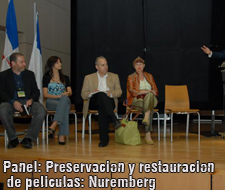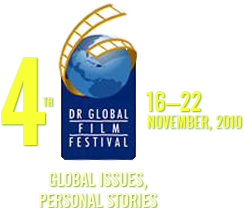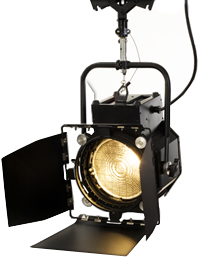

Dominican Republic Global Film Festival Organizers Attend the Berlin Film Festival
Berlin, February 20, 2011Dominican Republic Global Film Festival Attending the 33rd International Court Métrage Festival in France
Santo Domingo, February 8, 2010Dominican Republic Global Film Festival Celebrates the Nominations of 127 Hours
Santo Domingo, January 25, 2010An Even Grander Finale than Ever Newly Honored Liza Minnelli brings down the Curtain on Fourth DR Global Film Festival
Santo Domingo, November 21, 2010Closing Film of the 4th Dominican Republic Global Film Festival Delights Audiences, Young and Old
Santo Domingo, November 21, 2010Jury Chooses First, Second and Third Place Winners in the Second Annual Short Films Competition
Santo Domingo, November 21, 2010Actors workshop: Jimmy Jean Louis's Method for Acting Success and Getting Haiti and DR Together
Santo Domingo, November 21, 2010Short Films: The Beginning of Everything
Santo Domingo, November 21, 2010"Waste Land,” a documentary defending the environment
Santo Domingo, November 20, 2010A Dominican Passion
Outsourcing Baseball Development: Anthony Alcade’s "Buscón"!
Santo Domingo, November 20, 2010Web 3.0 is coming!
And the possibilities for small film producers are exciting!
Santo Domingo, November 20, 2010Profile of an actor: From the Stage to the Screen
Santo Domingo, November 20, 2010“Traces of the Trade: A Story from the Deep North” Personal Story of Discovery, History and How one Family Faces the Sins of their Ancestors
Santo Domingo, November 20, 2010
¨Nuremberg: Lesson for Today¨ Shows at the UASD in Santo Domingo
Santo Domingo, November 19, 2010

Anyone of a certain age and a minimal knowledge of modern history has heard of the Nuremberg Trials. Films about the Holocaust and the World War II certainly abound. But there is nothing quite like Sandra Schulberg´s ¨Nuremberg: Its Lesson for Today.” The reason is that Schulberg’s film is actually a restoration of film footage taken by the Nazis themselves, later compiled and made into a film in 1948 by Sandra’s father Stuart Schulberg, at the time the head of Marshall Plan Motion Pictures, and his brother Budd Schulberg. A great deal of Nazi footage was turned over to Budd Schulberg by the Russians, who liberated Berlin in 1945.
The courtroom drama of the first ever International Military Tribunal in which four allied prosecution teams – US, France, Britain and the Soviet Union – built their case against top Nazi war criminals using their own film footage as proof. It was the first time in history that film was used in a significant way in a courtroom, explained Sandra Schulberg.
 The film, showed in Germany in 1948 and 1949, never really saw the light of day in the United States where it was commissioned. In the US, the film sat in storage and slowly decayed although a copy had been sent to Germany. Sandra grew up not knowing much about the film itself except that her father, who died young, believed it wouldn’t be relevant for very long after WWII.
The film, showed in Germany in 1948 and 1949, never really saw the light of day in the United States where it was commissioned. In the US, the film sat in storage and slowly decayed although a copy had been sent to Germany. Sandra grew up not knowing much about the film itself except that her father, who died young, believed it wouldn’t be relevant for very long after WWII.
“He didn’t believe something of this magnitude could ever happen again, but it seems that genocide has continued,” said Schulberg, pointing out that in Rwanda the daily killing rate was actually higher than WWII Nazis although for a much shorter period of time.
About five years ago, while emptying her apartment for a move, Sandra found the amazing untold story of the film her father made nearly 45 years earlier. Why did the US government suppress this important documentary? Sandra explained that the reasons were three-fold: the Soviets and the US were no longer allies; the government didn’t want the US public to turn against Germany again when so much money was being poured into restoring it under the Marshall Plan. And the atrocities depicted in the film are very disturbing. The bombing of European cities, documents and film of Nazi leaders and Hitler himself dictating the takeover of Europe and beyond leave no doubt what their plans were and how far they would go to achieve them. And, of course, the concentration camps and systematic extermination of Jews, gypsies, useless non-Aryan children and elderly, gay men, etc. The list is long.
Sandra began to research, with the intention of restoring, the film her father wrote and directed for the US government. The job took nearly five years and the results are stunning.
Prior to the film, a panel comprised of Ms. Schulberg and other restoration experts such as Dennis Doros from Milestone Film and Video and Jerome Henry Rudes of LVT Subtitling, held a panel in which they discussed film preservation and restoration. Roberto Alvarez, Law Professor from the UASD and civil rights lawyer, moderated the panel.
See more photos on our Photo Gallery under Nuremberg, Nov. 18>



